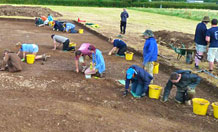Village Centre Ipplepen : Wiki Commons
Excavations are underway to unearth the mysteries of Devon’s newly discovered settlement dating back to Roman times.
Following the recent discovery of over 100 Roman coins in fields several miles west of Exeter, evidence of an extensive settlement including roundhouses, quarry pits and track ways was found from a geophysical survey. The site covers at least 13 fields and it the first of its kind in Devon which could force us to rewrite the history of the Romans in Britain.
Dr Ioana Oltean and Dr Martin Pitts, the University of Exeter’s Roman archaeology specialists, together with Danielle Wootton, Devon Finds Liaison Officer for the Portable Antiquities Scheme (PAS), Sam Moorhead, National Finds Adviser for Iron Age and Roman coins for the PAS at the British Museum, and Bill Horner, County Archaeologist at Devon County Council are leading the archaeological research which is proving to show the influence of Roman culture to be greater than previously thought.
Dr Oltean explained: “It is not a Roman town, but a native village which may have been in existence before the Roman period. However, it traded actively with the Romans, shown by the initial collection of coins found and the ornate pottery, usually found near large cities and military camps and not in villages where most people would have used basic wooden bowls. The uniqueness of this Romano-British settlement is shown in the level of coins and types of pottery found, indicating that an exchange in goods and money was happening in the area, on a much larger scale than known in other villages in Britain at this period of time.”
The excavation uncovered the remains of a round house, which were types of houses lived in by native Britons during the Iron Age. They were typically round structures with, a thatched roof and the lower walls were made of stone or wattle and daub, and were unlike the Roman houses which were usually square in shape. The presence of Roman pottery indicates that the round house was still used after the Romans arrived.
Danielle Wootton said, “Previously there was little evidence of any Roman influence beyond the Roman city of Exeter. We are starting to see more evidence of Roman influence further into Devon and Cornwall, through new discoveries such as Calstock and now this large Romano-British settlement. What is interesting on the site is that, despite the presence of Roman pottery and coins, the inhabitants are still living in native roundhouses, as Britons had done for centuries before, so they are maintaining some traditional ways whilst adapting to the influence of the Roman empire. We hope to continue with future research in the area to uncover more information and piece together the jigsaw of the extent of Roman influence in the county. The project is providing the wider community and University of Exeter students with an exciting opportunity for fieldwork experience and training. Volunteers from international environmental charity Earthwatch have travelled from Australia, Canada, the USA, and the Caribbean, specifically to work on the largest known Romano-British settlement in Devon and Cornwall.”
The site was initially discovered by metal detectorists Dennis Hewings and Phillip (Jim) Wills, who recorded all their finds with archaeologist Danielle Wootton. She explained: “This is a great example of metal detectorists and archaeologists working together. Dennis and Jim have thoroughly detected the area over the years and recorded every scrap of metal. The villagers and landowners have been very supportive of our project, and the local history society has been actively involved. After over a year of planning, it is great to see the project up and running and to involve Jim and Dennis, local villagers, University of Exeter students, and volunteers from overseas.”
Dr Ioana Oltean added: “In addition, this is an excellent opportunity for our students to learn how to be field archaeologists and how to communicate their findings with the public, including local enthusiasts, international volunteers and internet audiences.”

Sam Moorhead, National Finds Adviser for Iron Age and Roman coins for the PAS at the British Museum, believes that this is one of the most significant Roman discoveries in the country for many decades. He said: “It is the beginning of a process that promises to transform our understanding of the Roman invasion and occupation of Devon.”
The excavation is being funded by the University of Exeter, The Portable Antiquities Scheme, Earthwatch Insitute, the British Museum and Devon County Council
An Open Day to see the excavations and talk to the archaeologists and volunteers involved in the project is on Friday 17 August. The event is in Ipplepen village, between 11am and 3.30pm and is a free of charge and open to all members of the public. Ipplepen Community Hub (Methodist church) will provide more information about the location of the field excavation on the day.






